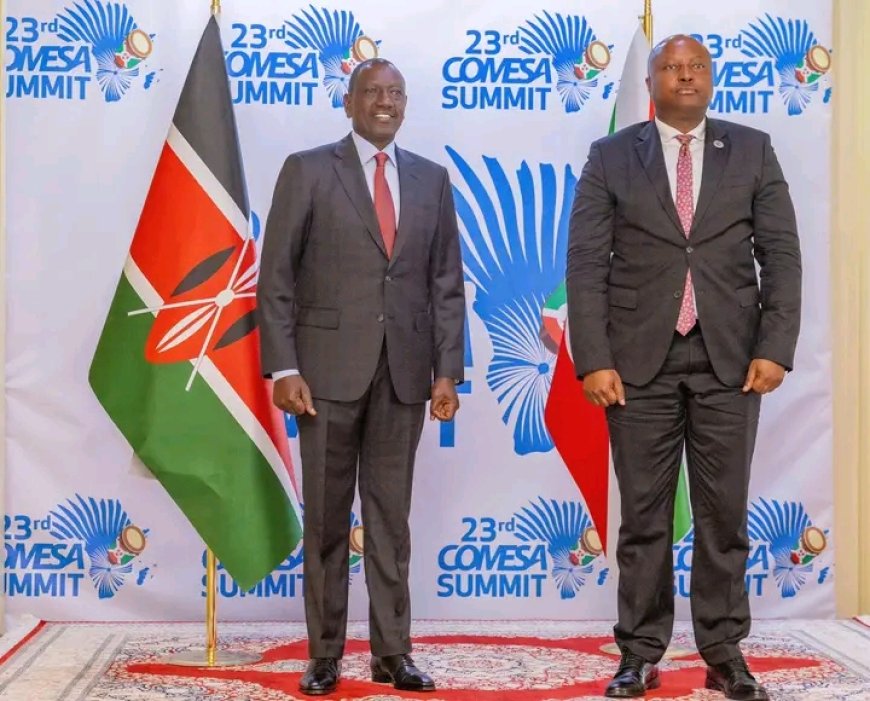Ratify Pan-African Settlement and Payment systems, Ruto tells COMESA

COMESA,
McCreadie Andias
President William Ruto has asked Member States of the Common Market for Eastern and Southern Africa (COMESA) to ratify Pan- African Payments and Settlement System(PAPSS) to streamline trade among the member countries.
PAPSS is a cross-border, financial market infrastructure enabling payment transactions across Africa by ensuring instant or near-instant transfers of funds between originators in one African country and beneficiaries in another.
While addressing fellow heads of states and government during the 23rd COMESA Summit held in Bujumbura, Burundi, on Thursday, the President emphasized on the need to reduce transaction costs for goods and services,noting that African payment system will save Africa more than $5 billion annually in payment and foreign exchange transaction costs boosting trade within COMESA.
“Instead of our traders chasing currency exchanges, they can be comfortably chasing trade initiatives,” President Ruto said.
PAPSS, a Leading-edge technology connecting African banks, payment service providers and other financial market intermediaries also Simplifies the historical complexities and costs of making payments across African borders, providing operational efficiencies that open up vast economic opportunities for all stakeholders.
Governments and central banks partnering with PAPSS have benefitted from easing the pressure on current accounts and demands for foreign exchange liquidity, increased transparency of cross-border trade activity, bringing greater oversight of cross-border transactions and increased potential to generate revenue, enhanced financial inclusion opportunities and improved economic growth through intra-African trade Agreement.
President Ruto also acknowledged COMESA for the coming into force of the Tripartite Free Trade Area (TFTA) last July.a move he says will harness the abundant potential of the African Continental Free Trade Area.
At the same time, the President urged COMESA member countries to embrace institutional reforms at the African Union.
He said AU must demonstrate seriousness in serving the more than 1.4 billion people in the continent.
In this connection, President Ruto took the opportunity to campaign for Kenya’s candidate for the post of AU- Commission Chairperson Raila Odinga.
He described the former Prime Minister as the best candidate for the position.
“I want to take this opportunity to ask for your support on the position of the AU Commission chairperson. Mr Odinga is the best man for the job,” he said.
At the same time, President Ruto challenged COMESA Member States to put more effort to achieve regional integration and address the current challenges.
In the past 30 years, President Ruto said, COMESA has evolved to become a central institution for regional integration, mobility and economic transformation.
“We have liberalized trade, significantly increased exports and improved trade facilitation within the bloc. We have also cooperated on vital issues of peace, security and sustainable development,” he said.
He pointed out that with a population of 640 million and a GDP of $1 trillion, COMESA is Africa’s largest economic bloc, offering significant opportunities for growth in employment and wealth creation through industrialisation and innovation.
“However, significant opportunities exist to increase our share of intra-COMESA trade and further create opportunities for our farmers, traders and manufacturers,” he said.
Zambian President Hakainde Hichilema officially handed over the instruments of power to President Ndiyishimiye, who will lead the 21-member trade bloc over the next year.
In his adress, President Hakainde highlighted the growth in trade exports from the block in the past four years.
He said the trading bloc’s exports have increased from $100 billion in 2020 to $219 billion in 2024.
He said there was a need to embrace technology to enable farmers increase on their production.
“It’s through technology that our farmers can increase production and make our region food secure,” He said.
Meanwhile, incoming chair Ndayishimiye encouraged the block to tap into mineral exploitation and Tourism sector to drive it's economy.
He said opening regional markets would enable the free flow of goods and services.
“Integration of our region is no longer an option but a necessity if we are to empower our people economically,” he said.
Mr Ndayishimiye also emphasized the need to resolve insecurity challenges facing Eastern DRC, Sudan and Somalia.
With the theme, “Accelerating Regional Integration through the Development of Regional Value Chains in Climate Resilient Agriculture, Mining, and Tourism,” the Summit emphasized growth strategies that align with sustainability and shared prosperity across COMESA.
The new Bureau includes Burundi as Chair, Kenya as Vice Chair, and Zambia as Rapporteur. During the event, COMESA Secretary General Chileshe Mpundu Kapwepwe presented the State of Integration Report, showcasing significant strides in regional development over the past year.
Highlights included enhanced intra-regional trade facilitation, from improved customs border management and streamlined clearance processes to the digitization of trading tools.
What's Your Reaction?


































































































































































































































































































